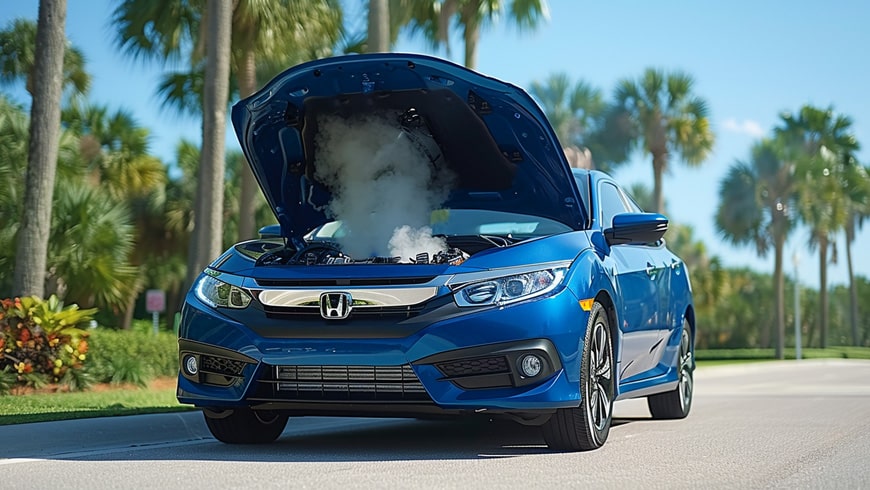Engine overheating can be a nightmare for car owners. It’s a common problem that can lead to severe damage if not addressed promptly.
Is damage caused by an overheated engine covered by car insurance? The answer is usually ‘no’ but it isn’t always that straightforward (we tend to say that a lot).
Generally speaking, standard auto insurance policies don’t cover engine damage caused by overheating.
Why?
Because this type of damage is typically considered a mechanical failure or wear and tear, which falls under routine maintenance—not an unexpected accident or incident.
Mechanical Breakdown is Specifically Excluded
Let’s dive into the specific language of a car insurance policy to see exactly why engine damage from overheating is not normally covered.
The ISO auto insurance policy form, which serves as a template for many insurers, contains crucial wording that affects coverage for engine overheating:
“We will not pay for loss caused by or resulting from any mechanical or electrical breakdown or failure, including such damage resulting from or caused by wear and tear, freezing, or overheating.”
This language clearly indicates that damage from overheating, regardless of cause, is generally not covered.
Most policies explicitly exclude coverage for “mechanical or electrical breakdown or failure.” This exclusion is critical for several reasons:
- Predictable wear and tear: Engines, like all mechanical parts, naturally degrade over time. Insurers consider this predictable and part of normal vehicle ownership.
- Maintenance responsibility: Regular upkeep, including monitoring coolant levels and addressing warning signs, falls under the owner’s responsibility. Insurance isn’t designed to cover neglect or poor maintenance.
- Risk management: If policies covered all mechanical failures, premiums would skyrocket. By excluding these issues, insurers can keep costs more manageable for policyholders.
- Preventing moral hazard: Without this exclusion, some owners might neglect proper care, knowing insurance would cover any resulting damage.
When you think about those exclusions, they really make good sense as to why the excluded perils would not be covered by car insurance.
Understanding these exclusions helps explain why routine maintenance is so crucial. Get your oil changed on time, follow your owner’s manual service recommendations, and if you get an engine warning light on your dash, don’t just ignore it.

Exceptions to the Rule
What if your engine overheated because of a sudden, unexpected event? Imagine you’re driving along, and another vehicle hits your front end, breaking a core tube in your radiator causing the coolant to leak out.
The damage causes your engine to overheat rapidly. In this case, your collision coverage might come to the rescue (but hopefully the other driver was insured and their property damage liability coverage would cover the damage).
The initial accident would be covered, and the resulting engine damage could potentially be included as a direct consequence of the collision.
Another scenario to consider
What if vandals tamper with your cooling system (yeah, it could happen), leading to overheating? Comprehensive coverage, which protects against non-collision-related incidents like theft and vandalism, might apply here.
It’s all about the root cause of the overheating. But again, if it’s simply due to a lack of vehicle maintenance or upkeep, then you’re going to be out of luck.
Prevention and Maintenance
So, what’s the takeaway for savvy car owners? Prevention is key.
Regular maintenance can help you avoid overheating issues altogether. Keep an eye on your temperature gauge, ensure your coolant levels are adequate, and address any warning signs promptly.
Remember, an ounce of prevention is worth a pound of cure—especially when it comes to your vehicle’s engine and drivetrain.
Conclusion
While standard car insurance typically won’t cover engine damage from overheating, there are exceptions based on the cause.
Always review your policy carefully and ask your insurance agent about specific scenarios. And most importantly, take good care of your vehicle to prevent these issues in the first place. After all, isn’t it better to avoid the headache altogether?
 During his career as an independent insurance agent,
During his career as an independent insurance agent,